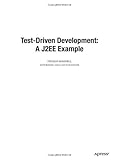Test-Driven Development: A J2EE Example (Expert's Voice)

I'm left inspired to write unit tests for every upcoming task, and I regret many previous tasks for which I've never written tests.
— John Flinchbaugh's Weblog

— John Flinchbaugh's Weblog
Not version-specific, this unprecedented book explains development tools and methodologies in conjunction with real-world cases and examples. It includes the use of open source unit testing frameworks such as JUnit and its extensions. The authors include complete stages: test coverage strategies, test organization, TDD incorporation, and automation. Two appendices are also included, for test planning and reference.
List Price: $ 39.99
Price: $ 24.37
Urban Planning And The Development Process
This text is about the very essence of urban planning in a market economy. It is concerned with people - landowners, developers, investors, politicians and ordinary members of the public - who produce change in towns and cities as they relate to each other and react to development pressure. Whether such change occurs slowly and is almost unnoticed, or happens rapidly and is highly disruptive, a production process is creating a finished product: the built environment. This form of production, known as the land and property development process, is regulated but not controlled by the state. Urban planning is therefore best considered as one form of state intervention in the development process. Since urban planning would have no legitimate basis without state power, it is an inherently political activity, able to alter the distribution of scarce environmental resources. Through doing so, it seeks to resolve conflicts of interest over the use and development of land. However, urban plans that appear to favour particular interests (such as house-builders) above others (such as community groups) provoke intense controversy. Development planning can thus become highly politicized, with alliances and divisions between politicians not always explained by traditional party politics. These issues are explored with particular reference to statutory plan-making at the local level. The author draws on his extensive research into urban planning and development, making use of recent case studies and examples to illustrate key points. There are four parts. The first explores the operation of land and property markets and development processes, and examines how the state intervenes in the form of urban planning. The second part looks at the people and organizations who play a critical role in shaping the built environment and considers their relationship with the planning system. Specific attention is paid to important actors in the development process, such as landowners, developers, financial institutions, professional advisers and to the variety of agencies in the public sector that aim to promote development. This concludes with discussion of public-private partnerships and growth coalitions. The third part of the book concentrates on local development planning.
List Price: $ 61.95
Price: $ 47.35
More Development Products
No comments:
Post a Comment